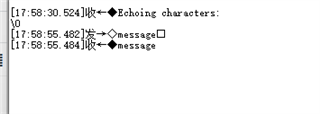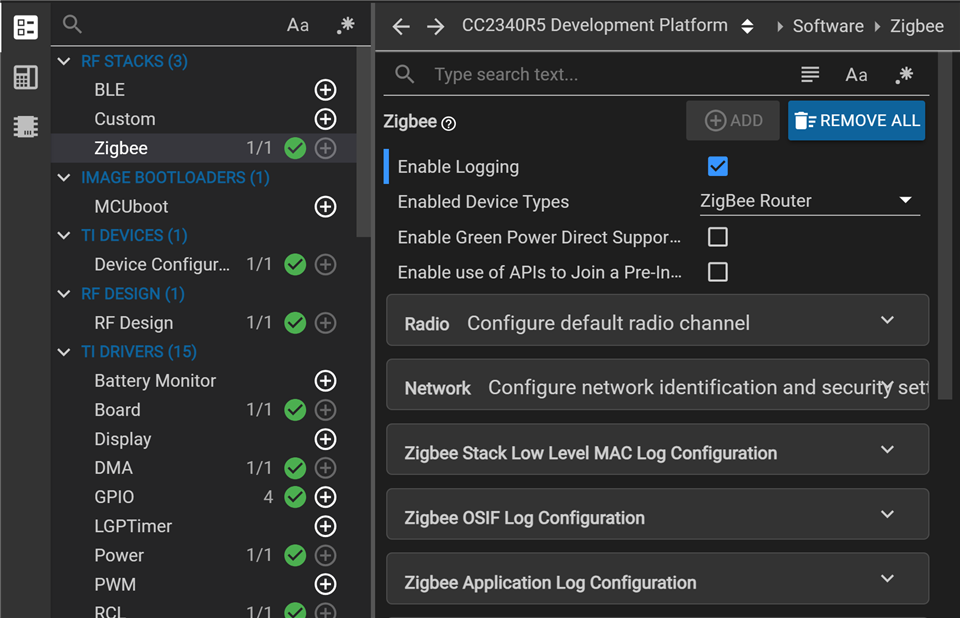Other Parts Discussed in Thread: SYSCONFIG, CC2340R5
Tool/software:
Hi
The running example is a door lock.
After adding the initialization of logs to my initialization process, it just keeps getting stuck in the serial port input and output process. However, the underlying logic for the other Zigbee devices is not functioning.
The desired effect is that when there is input on the serial port, the characters should be received and corresponding logical processing should be carried out. And it is also output via the serial port. Then the logic of Zigbee is not affected either.
How should it be modified?
/* door_lock.c */
#include "uart2callback.h"
MAIN()
{
ARGV_UNUSED;
/* Global ZBOSS initialization */
ZB_INIT("door_lock");
logThread(NULL); // 日志初始化
uart2_printf("zboss_start\r\n");
...
}
/* uart2callback.c */
#include <stdint.h>
#include <stddef.h>
/* POSIX Header files */
#include <semaphore.h>
/* Driver Header files */
#include <ti/drivers/GPIO.h>
#include <ti/drivers/UART2.h>
/* Driver configuration */
#include "ti_drivers_config.h"
#include <stdarg.h>
#define LOG_ENALBE
static sem_t sem;
static volatile size_t numBytesRead;
static UART2_Handle uart;
void uart2_printf(char *buffer);
/*
* ======== callbackFxn ========
*/
void callbackFxn(UART2_Handle handle, void *buffer, size_t count, void *userArg, int_fast16_t status)
{
if (status != UART2_STATUS_SUCCESS)
{
/* RX error occured in UART2_read() */
while (1) {}
}
numBytesRead = count;
sem_post(&sem);
}
/*
* ======== logThread ========
*/
void *logThread(void *arg0)
{
char input;
const char echoPrompt[] = "Echoing characters:\r\n";
UART2_Handle uart;
UART2_Params uartParams;
int32_t semStatus;
uint32_t status = UART2_STATUS_SUCCESS;
/* Call driver init functions */
//GPIO_init();
/* Configure the LED pin */
//GPIO_setConfig(CONFIG_GPIO_LED_0, GPIO_CFG_OUT_STD | GPIO_CFG_OUT_LOW);
/* Create semaphore */
semStatus = sem_init(&sem, 0, 0);
if (semStatus != 0)
{
/* Error creating semaphore */
while (1) {}
}
/* Create a UART in CALLBACK read mode */
UART2_Params_init(&uartParams);
uartParams.readMode = UART2_Mode_CALLBACK;
uartParams.readCallback = callbackFxn;
uartParams.baudRate = 115200;
uart = UART2_open(CONFIG_UART2_0, &uartParams);
if (uart == NULL)
{
/* UART2_open() failed */
while (1) {}
}
/* Turn on user LED to indicate successful initialization */
//GPIO_write(CONFIG_GPIO_LED_0, CONFIG_GPIO_LED_ON);
/* Pass NULL for bytesWritten since it's not used in this example */
UART2_write(uart, echoPrompt, sizeof(echoPrompt), NULL);
/* Loop forever echoing */
while (1)
{
numBytesRead = 0;
/* Pass NULL for bytesRead since it's not used in this example */
status = UART2_read(uart, &input, 1, NULL);
if (status != UART2_STATUS_SUCCESS)
{
/* UART2_read() failed */
while (1) {}
}
/* Do not write until read callback executes */
sem_wait(&sem);
if (numBytesRead > 0)
{
status = UART2_write(uart, &input, 1, NULL);
if (status != UART2_STATUS_SUCCESS)
{
/* UART2_write() failed */
while (1) {}
}
}
}
}
void uart2_printf(char *buffer)
{
#ifdef LOG_ENALBE
int len=strlen(buffer);
if(uart)
{
UART2_write(uart,buffer,len,NULL);
}
#endif
}

Best Regards,
yongjian



